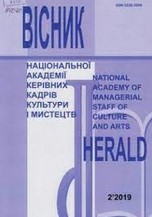INSTRUMENTAL ART OF UKRAINE IN THE 1960s – THE BEGINNING OF THE 21st CENTURY: STUDYING FROM THE STANDPOINT OF THE PHILOSOPHY OF MUSICAL ANALYSIS
INSTRUMENTAL ART OF UKRAINE IN THE 1960s – THE BEGINNING OF THE 21st CENTURY: STUDYING FROM THE STANDPOINT OF THE PHILOSOPHY OF MUSICAL ANALYSIS
Author(s): Anastasia Igorivna KravchenkoSubject(s): Cultural history, Music, Aesthetics, Post-War period (1950 - 1989), Transformation Period (1990 - 2010)
Published by: Національна академія керівних кадрів культури і мистецтв
Keywords: chamber and instrumental art of Ukraine; philosophy of music; philosophy of musical analysis; discursive analysis of a musical work; musical meaning; composition; performance;
Summary/Abstract: Purpose of Research. The purposes of the research are to identify the specifics of the philosophy of musical analysis in basic philosophical, aesthetic and musicological categories and to outline its significance in the cultural studies of the phenomena of Ukrainian musical art, in particular, chamber-instrumental (based on the work of representatives of the Ukrainian school composers of the 60s of the XX-th century - the beginning of the XXI-st century). Methodology of Research. The research methodology is based on the combination of the application of a number of scientific approaches and the following methods: analytical, semiotic, hermeneutic, cultural and art studies ones, which allow us to consider the issue of the methodology of the analysis of musical works from in the context of the philosophy of music. Scientific Novelty. The scientific novelty of the research is the generalization of existing concepts in order to further develop the principles of the philosophy of musical analysis in a combinatorial combination of classical musicological and «discursive» analysis. This approach allows us understanding the formal-structural, content-semantic and semantic aspects of the organization of musical material in their integrity within the process of compositional and performing creativity. Conclusions. It has been proven that the creation, reproduction and perception of compositions is a process of worldview self-awareness through their works. The variability of interpretive versions of cultural hermeneutic understanding of musical meaning is formed in medial channels at the communicative junction of mutual exchange of artistic and aesthetic information between its generator, translator and perceiver. So, the importance of the philosophy of musical analysis in the study of the works of chamber-instrumental art of representatives of the Ukrainian school composers and their compositions is highlighted.
Journal: Вісник Національної академії керівних кадрів культури і мистецтв
- Issue Year: 2022
- Issue No: 2
- Page Range: 165-169
- Page Count: 5
- Language: English

